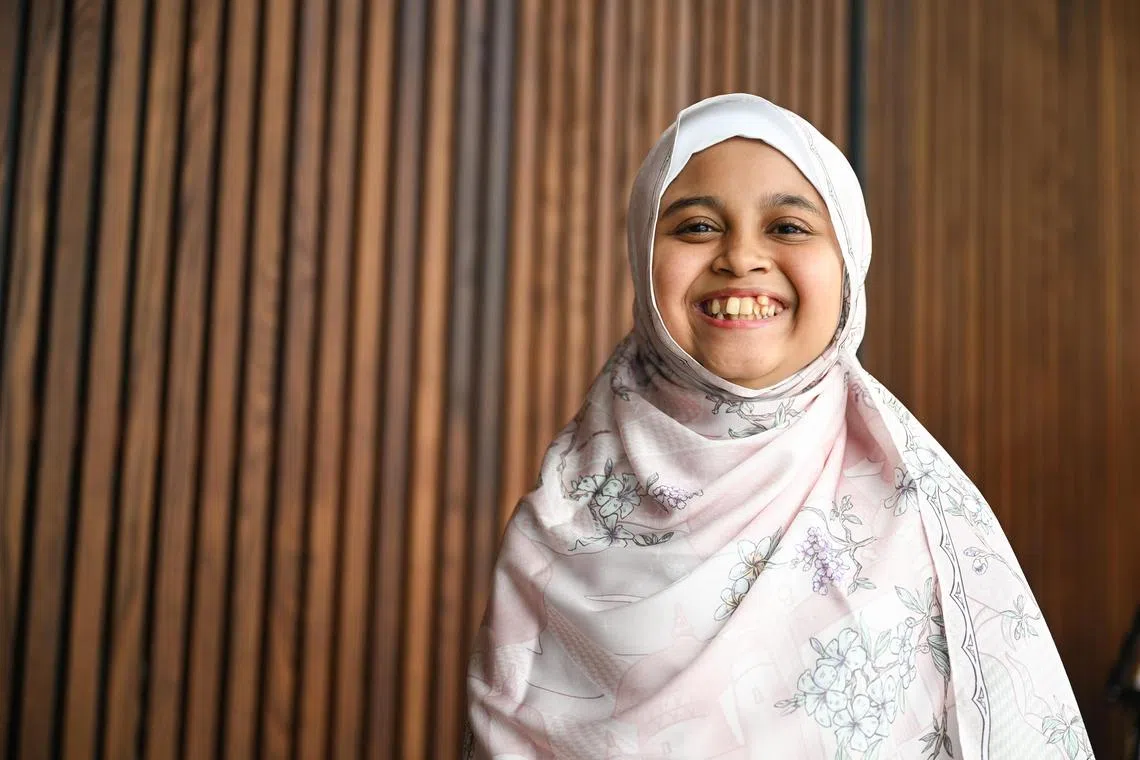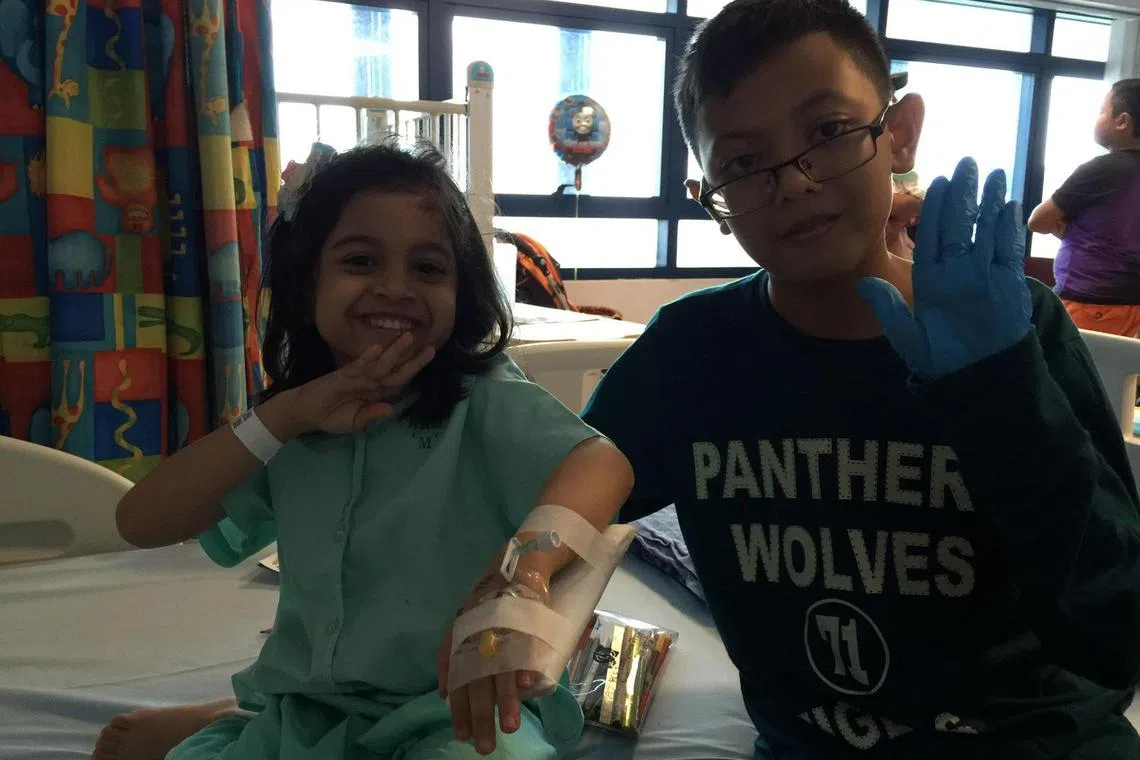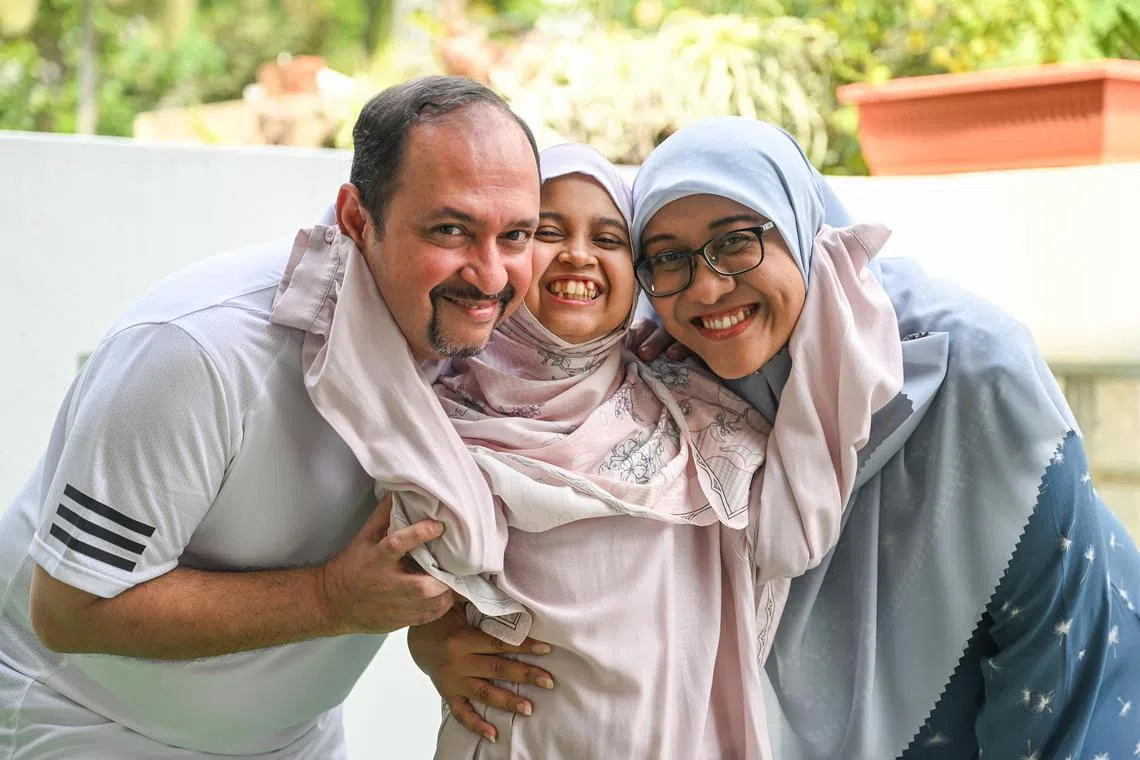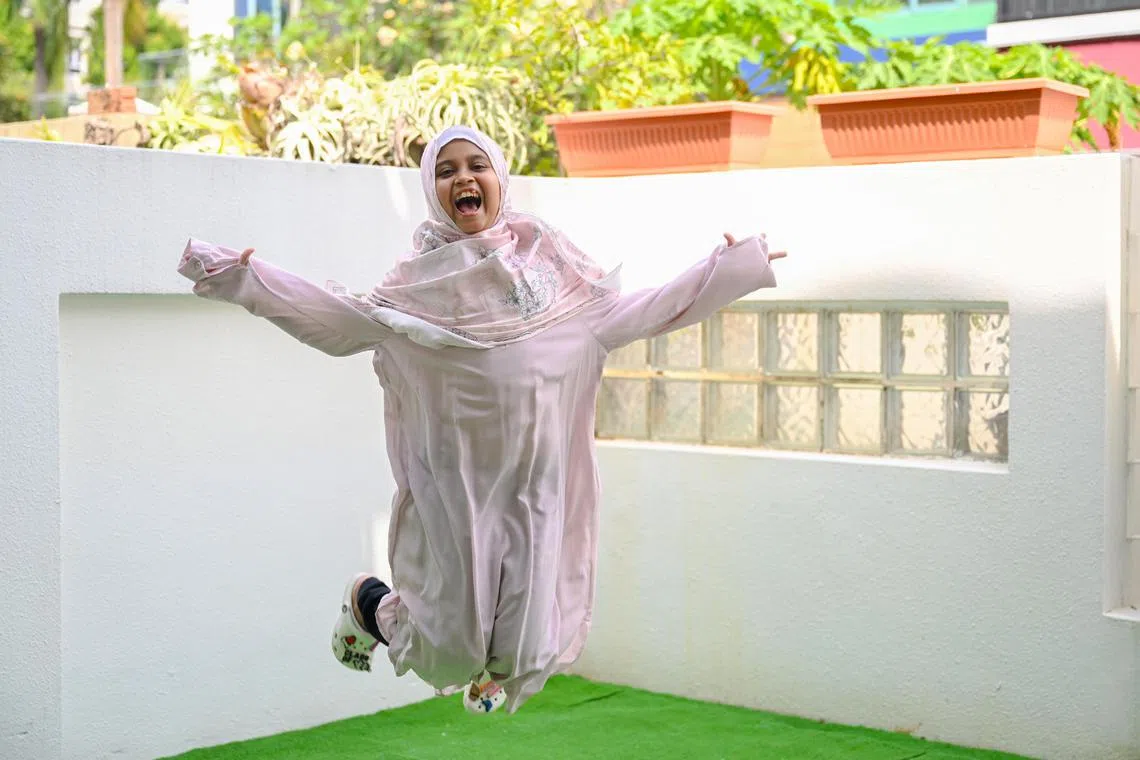Teen with rare liver disease gets to celebrate Hari Raya, thanks to transplant, blood donations
Sign up now: Get ST's newsletters delivered to your inbox

Falisha Zafilin had a liver transplant in October 2022, and needed platelet transfusions due to a post-surgery complication.
ST PHOTO: AZMI ATHNI
Follow topic:
SINGAPORE – Temasek Secondary School student Falisha Zafilin was just six when she was diagnosed with a rare chronic liver disease, but with a liver transplant and blood transfusions in 2022, she could celebrate another Hari Raya Aidilfitri on April 10.
Falisha, now 14, enjoys reading and writing as well as acting. She is a member of her school’s drama co-curricular activity group, known as Serious Play. “I will be acting as a zombie in an upcoming show,” she told The Straits Times.
However, she could not always be so involved in school activities due to her health.
Before Falisha turned two, her mother, Madam Siti Zubaidah Mohamed Sharif, 45, noticed blood in the girl’s faeces. The toddler was diagnosed with inflammatory bowel disease (IBD) at KK Women’s and Children’s Hospital (KKH).
In 2015, Falisha was diagnosed with primary sclerosing cholangitis (PSC) at KKH after she underwent a liver biopsy when her IBD medication did not work, and she repeatedly failed her liver function tests. She was referred to the National University Hospital (NUH) in 2018 for a second opinion after another liver biopsy indicated that her condition had worsened.
Dr Lee Ser Yee, senior consultant hepatopancreatobiliary surgeon at colorectal and liver clinic Surgical Associates, said PSC is a very rare chronic liver disease of unknown cause characterised by ongoing inflammation, destruction and scarring of the bile ducts.
“Patients may have episodes of abdominal pain, itchy skin, diarrhoea, jaundice, fatigue and fever due to blockage, infection and inflammation of the bile ducts,” said Dr Lee.
“Treatment consists mainly of treating the symptoms and/or complications, such as cholangitis with antibiotics, or end-stage liver damage with a liver transplantation. There is no cure at this point. Patients are on regular surveillance and follow-up due to their increased risk of bile duct cancer over time.”
Adapting to IBD and PSC was not easy for Falisha, especially when she had to attend school. “I felt tired and I had hair loss,” she said. “I missed a lot of school and my friends asked me why I skipped school.”
Her father, Mr Zafilin Abdul Hamid, 48, said he did not blame her friends as it was hard for them to understand her condition. He added: “We had to keep checking if the activities in school would affect her condition, and her social circle was also affected because she missed school.”
In the first few weeks when Falisha began primary school, her grandmother went to school with her for half a day in case she needed to use the toilet.
Her parents were grateful to her schools for being understanding. “Falisha’s classroom was specially arranged to be very near the female toilet,” they said. In 2021, during Falisha’s PSLE year, she had severe jaundice. After a third liver biopsy, doctors said her liver could last for only another year.
After her transfer to NUH in April 2022, she underwent tests from June to see if she was a viable candidate for a transplant.

Falisha Zafilin and her brother Naufal Munzir in June 2015.
PHOTO: MADAM SITI ZUBAIDAH MOHAMED SHARIF
In July, she had a cancer scare, which, if confirmed, would have ruled out a transplant. A lung biopsy later cleared her of cancer. She was back on the transplant list but still needed a donor.
Her parents, who are educators, could not donate their livers because of incompatible blood types. “We felt lousy because we could not help,” said Mr Zafilin.
In September, her family was informed that an altruistic donor had stepped forward.
Falisha had a liver transplant in October, and needed platelet transfusions due to a post-surgery complication.
Falisha’s primary doctor, Dr S. Venkatesh Karthik, a senior consultant at the National University Centre for Organ Transplantation (Nucot) at NUH, told ST that the NUH team was “glad to see Falisha undergo successful liver transplantation”.
He added: “We continue to monitor her progress post-liver transplantation closely. It has been a gratifying experience to witness Falisha’s journey towards recovery and a new lease of life.”
Mr Zafilin said: “We wanted to meet (the donor) or at least do something to show our appreciation, but we were not allowed to.”
He said Falisha and the donor exchanged letters and gifts, facilitated by Nucot, without both parties meeting.

Falisha Zafilin (centre), 14, with her parents Mr Zafilin Abdul Hamid, 48, and Madam Siti Zubaidah Mohamed Sharif, 45, both educators, at their home on April 6.
ST PHOTO: AZMI ATHNI
Last Hari Raya was the first that Falisha did not spend in the hospital since she became sick, said Madam Zubaidah. However, the family kept visiting to a minimum as it was just six months after her transplant.
“We were mindful that Falisha should not be in a crowded area or exert herself physically and are doing the same this year as she has had episodes of being unwell,” she added.
With her new lease of life and having developed an interest in drama and script-writing as she got older, Falisha now wants to chase that dream. “I wish to pursue drama and use drama to help others,” she said.

Falisha enjoys reading and writing as well as acting. She is a member of her school’s drama co-curricular activity group.
ST PHOTO: AZMI ATHNI
Thanking the donor for the generous act, Madam Zubaidah said the donor is “an angel and we are really blessed”. She added that the family also realised how important blood donations were to Falisha’s transplant.
Hoping that more people will donate blood, Falisha said: “I feel so touched. I don’t even know who donated blood to me and I think it is so selfless.”
A spokeswoman for the Singapore Red Cross (SRC) said only 1.87 per cent of Singapore’s residential population are blood donors currently, and 39 per cent of them donate more than twice a year. A total of 122,668 units of whole blood were collected in 2023, with each unit containing 350ml to 450ml.
“Blood is required daily for different illnesses and injuries,” she said. “It is not only required for those bleeding from injuries or surgery, it is also needed to meet the critical needs of patients with blood disorders or other medical conditions.”
The spokeswoman added that blood has a short shelf life – six weeks for red cells and seven days for platelets.
“Each year, almost 34,000 patients in Singapore require a safe and steady stream of blood supply to sustain or improve their quality of life,” she said.
“We need to collect about 400 units of blood daily to meet the needs of patients in Singapore, and only healthy blood donors can contribute to this supply.”
In June 2023, Health Minister Ong Ye Kung appealed to those with O+ and O- blood types to give blood and raise the national blood stocks, as he launched a new award to encourage more youth to become regular donors.
SRC’s spokeswoman said: “We hope Singapore youth will step forward to donate. They are the next generation of blood donors, and their commitment is key to future-proofing our national blood stocks for those whose lives depend on blood transfusions. With about 600 donors stopping donation due to age or illnesses each year, it is crucial to constantly increase our pool of blood donors.”
Donations can be made at blood banks in Outram, Dhoby Ghaut, Woodlands, Westgate Tower and One Punggol, or at SRC’s community blood drives.
Community and corporate groups can call SRC on 6220-0183 or e-mail donate.blood@redcross.sg
To stay informed about the latest blood donation news, including community drive locations and the blood stock situation, the public can follow SRC on Instagram (@sgredcross and @heybloodbuddy) and Facebook (Singapore Red Cross).
The public can visit giveblood.sg for more information.

